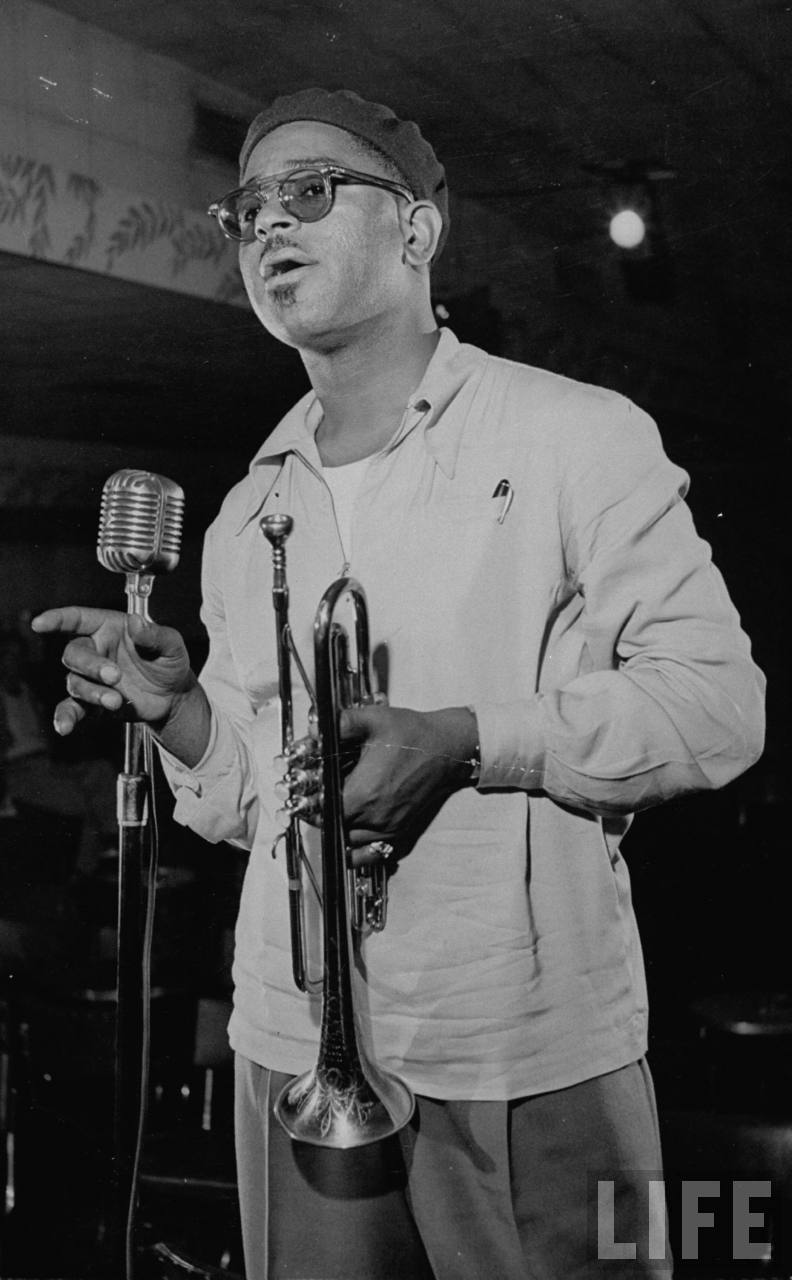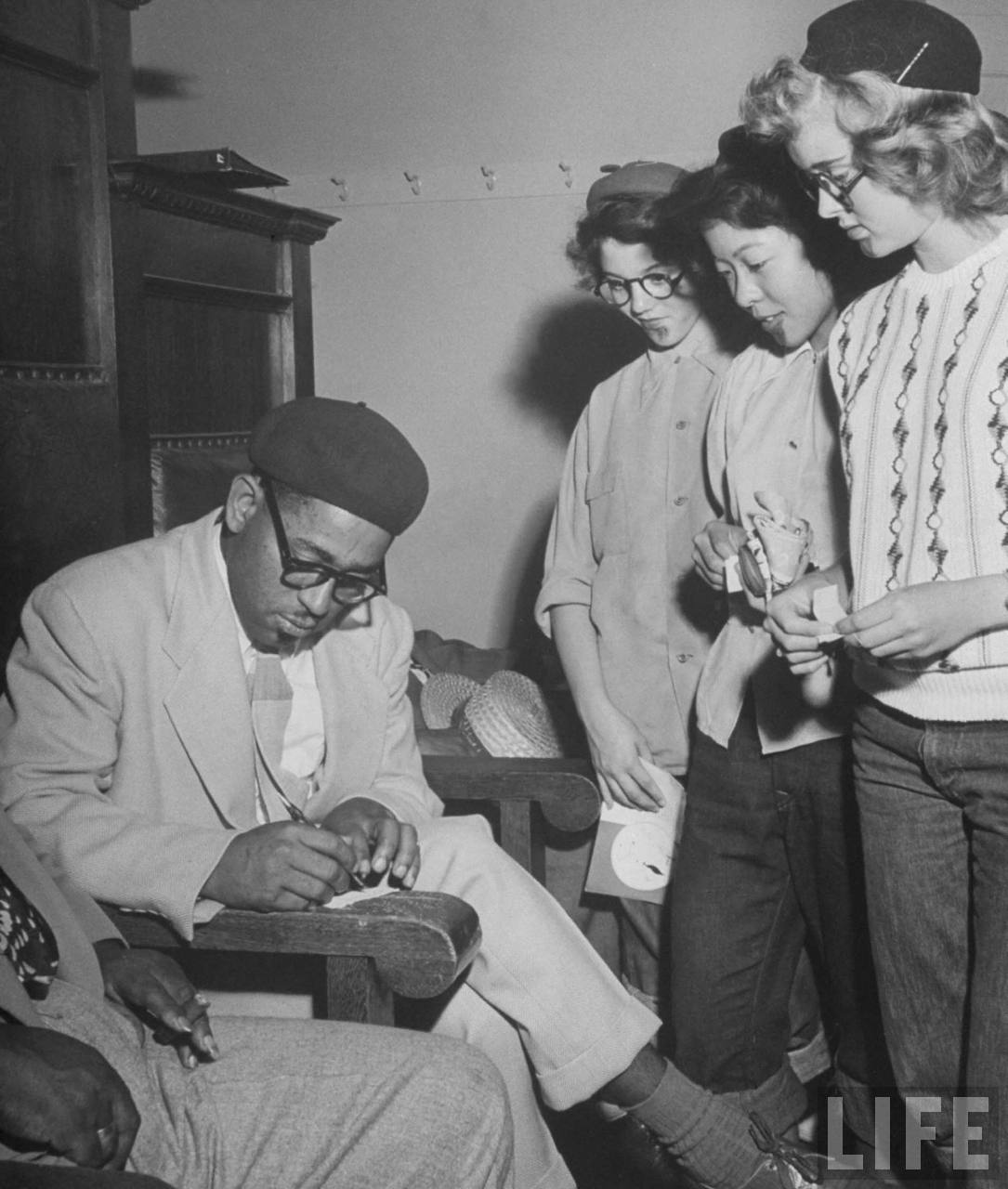|
Arts > Music >
Jazz > USA > "Dizzy" Gillespie 1917-1993

Dizzy Gillespie, "bebop" king,
is making a announcement
before playing his trumpet.
Location: Hollywood, CA, US
Date taken: September 1948
Photograph: Allan Grant
Life Images
http://images.google.com/hosted/life/fe6f7fd454d0b8ac.html

Teen-age girls in blue jeans,
wearing the beret, horn rimmed glasses and goatee
affected by Dizzy Gillespie, "bebop" music king,
stand to have
his autograph.
Date taken: September 1948
Photograph: Allan Grant
Life Images
http://images.google.com/hosted/life/d6f2abb5fce1784d.html
John Birks "Dizzy" Gillespie 1917-1993
trumpet player whose role
as a founding father of modern jazz
made him a major figure
in 20th-century American music
and whose signature
moon cheeks and bent
trumpet
made him one of the world's
most instantly recognizable figures
(...)
In a nearly 60-year career
as a composer, band leader
and innovative
player,
Mr. Gillespie cut a huge swath
through the
jazz world.
In the early 40's,
along with the alto saxophonist
Charlie
(Yardbird) Parker,
he initiated be-bop,
the sleek, intense, high-speed revolution
that has become jazz's most enduring style.
In subsequent years
he incorporated Afro-Cuban music
into jazz, creating a new genre
from the combination.
http://www.nytimes.com/learning/general/onthisday/bday/1021.html - broken
link
https://www.npr.org/artists/15368367/
dizzy-gillespie
https://en.wikipedia.org/wiki/
Dizzy_Gillespie
https://en.wikipedia.org/wiki/
List_of_works_by_Dizzy_Gillespie
https://www.nytimes.com/2024/01/05/
realestate/dizzy-gillespie-queens-jazz.html
https://www.npr.org/2008/07/25/
92911900/the-legendary-dizzy-gillespie-on-piano-jazz
https://www.nytimes.com/1993/01/07/
arts/dizzy-gillespie-who-sounded-some-of-modern-jazz-s-earliest-notes-
dies-at-75.html
https://www.nytimes.com/1978/01/22/
archives/new-jersey-weekly-dizzy-gillespie-on-life-love-jazz.html
April 19 1960
Davis and Dizzy
compared
From The Guardian archive
April 19 1960
The Guardian
Miles Davis is one of the most advanced innovators in modern jazz: the same
was said of Dizzy Gillespie fifteen years ago. Two recent releases afford an
interesting comparison between them. Davis's work (Fontana TFL 5072) does not
seem as far out of the normal pattern as Gillespie's at the time, but the ear
has now grown more accustomed to accepting change.
The first sound of Gillespie's brittle and angular flights, apparently in
defiance of the chord sequence behind them, struck a world used to the bland
harmonising of "traditional" and swing bands.
The reaction was meat and drink to Gillespie. His music, brash and extrovert,
has always reflected its creator. The more controversy he could stir with his
melodic and rhythmic juggling, the more intricate his experiments became. At one
stage it became a point of principle with him that no other musician should be
able to follow his circumnavigation of any tune. (He and Thelonious Monk used to
map fantastic chord progressions which they set about if any other player came
to sit with them, leaving him adrift wondering where the tune went.)
The questing spirit remains. His latest record (H.M.V. CLP 1318) shows he is
concerning himself with leavening what he regards as the rhythmic dough of jazz.
His fingers press here and there, and the result is a more digestible offering.
In places he has overdone it slightly and we have to make do with puff pastry
where we expected bread, but that is to be expected from experiment.
Davis also concerns himself with rhythmic effect, but in another way. His
preoccupation is mainly with the pattern of the melodic instruments. He is as
fond of riffs as any rock'n'roller, though with a little more sensitivity. Where
the rock man will bash his way up the chord from tonic to dominant and back,
apparently to eternity, Davis plays nervously with repeated semitone figures,
different for each instrument and constantly changing in accent and rhythm. The
effect is less unsettling than it may sound, for Davis's bland, unifying trumpet
knits it together admirably.
There could not be a greater contrast between Davis's and Gillespie's approach.
Where Gillespie looked his audience over, laughed at it and defied it to
understand what he was doing, Davis seems unaware that he has an audience. His
effects are aimed at himself and at those who play with him. He never laughs;
nor, for that matter, does he cry. The general aspect of his music is one of
inquiring melancholy. His work repays study.
Harold Jackson
From The Guardian
archive > April 19 1960 >
Davis and Dizzy compared,
G,
Republished 19.4.2007,
p.
32,
http://digital.guardian.co.uk/guardian/2007/04/19/
pages/ber32.shtml
Related > Anglonautes > Arts > Music
jazz
Related > Anglonautes > Vocapedia > Music
jazz
Related > Anglonautes >
History
20th century > USA > Civil rights
17th, 18th, 19th, 20th century
English America, America, USA
Racism, Slavery,
Abolition, Civil war,
Abraham Lincoln,
Reconstruction
17th, 18th, 19th century
English America, America, USA
|